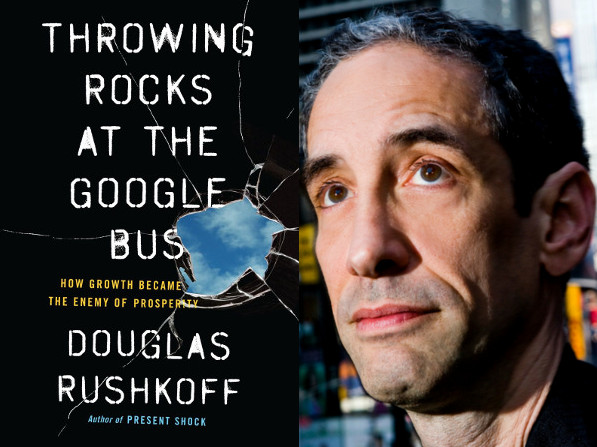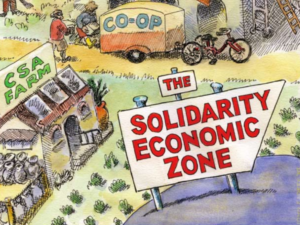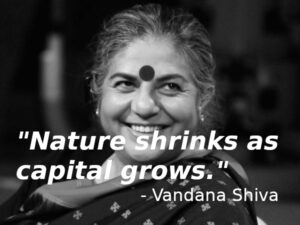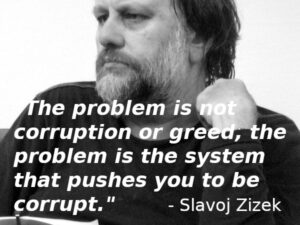It’s worse than you think: review of Douglas Rushkoff’s ‘Throwing Rocks at the Google Bus’

Here’s an article that’s part review of the latest book by Douglas Rushkoff (buy it – it’s excellent), part ramble about twenty-first century capitalism.
How growth became the enemy of prosperity
Front and centre of Rushkoff’s message is that attempting to achieve perpetual growth on a finite planet is a recipe for extinction. If you’re a regular visitor to this blog, then this might seem obvious to you – but it needs popular authors like Rushkoff to try to get it across to more people, because as I write, almost no economics graduates are leaving university with this understanding. It’s analogous to atronomy graduates believing that the earth is flat or evolutionary biologists graduating with a belief in young earth creationism – but that’s the way it is. Economics students are taught absurdities, which results in the absurdity of a cancerous economy destroying our biosphere. He also explains that it’s not as though we can stabilise capitalism even if the will were there to do it. Modern capitalism is an economic system that can’t stop growing. The ubiquitous quest for both profit and interest on debt (on which the entire economy is based) means that the economy has to grow constantly to be able to achieve those things. A stable economy can’t pay off the interest on the debt or provide profits. And even if it stalls, governments will reduce interest rates, do a bit of quantitative easing or maybe invade another country – anything to get the economy growing again.
But people are becoming less important cogs in the capitalist machine. His insider knowledge of how the 21st century finance sector really works is sobering and scary. First there’s the productive economy – i.e. the provision of useful products and services – on top of which are various abstractions based on gambling on how it will perform. The first abstraction is the stock market, that investors used to access via flesh-and-blood stockbrokers. It was a staid, temperate profession, but stockbrokers were put out of business, first by traders, then by technology. We now have websites that help the public to dabble on the stock market. These beginners are fleeced by algorithms.
Have a cuppa and listen to this. You’ll learn more about how the world works than from several hundred ‘Newsnights’.
Capitalism as computer game
As IT has improved, investment houses have developed algorithms that can scan stock prices, and buy and sell much more efficiently than humans. What should have been obvious though (and probably was) is that the wealthier the financial institution, the more money they would be able to pay for the best programmers to develop more and more powerful algorithms on faster and faster computers, in a financial arms race. It also should have been obvious that this arms race wouldn’t be won by the most ethical companies. Algorithms started to cheat – to put in huge bids for stock that would influence the market heavily, but then withdraw the bids before fulfilment, causing a crash in the stock price, after which they would hoover up the stock at extremely low prices, knowing full well that they had caused the crash, and that the stock would rise in value again. Simultaneously, the algorithms had bet that the crash would happen, knowing for sure that it would. What proportion of trading do these kinds of fraudulent activities comprise? Around 90%, according to Rushkoff.
Now, it’s all about speed. The most powerful algorithms, on the world’s fastest computers can, and do, intercept bids from less powerful algorithms on slower computers, buy up their targeted stock a few nanoseconds before they get to it, then immediately sell it to them for a few pennies more than they would have paid had they got to the seller first. The few pennies don’t make much difference to each sale, but the combined reward for such activity globally is in the hundreds of billions. Geographical location is important too. So the world’s wealthiest financial institutions can afford huge super-computers literally right next door to the computers of the world’s biggest stock markets. This wins them a few more crucial nanoseconds.
This understanding will help you see capitalism in a new light. It’s not about corrupt individuals or robber barons. Capitalism is a game – a giant computer game played by the world’s most powerful algorithms on the world’s fastest computers, owned by the world’s wealthiest investment houses. The derivatives (gambling) market is ten times the size of the real, productive economy of goods and services, and extracts all its value from it – ultimately, from the people doing productive work. It doesn’t make economic sense to work in the productive economy any more – only to bet on it. Money makes you money; doing useful things gets you exploited.
It’s all about ownership
This is nothing to do with investment. This is just gaming – gambling. An investor is looking at the value of a company that they’re thinking of investing in, to work out how it will perform in the long-term. Algorithms are just looking at changes in share price – true value doesn’t matter, as long as they win the game.
Just in case you think that this kind of critique of shareholder capitalism is confined to the radical fringe – even the Conservative party has started to question capitalism’s obsession with share price, and whether this is the best indicator of health and happiness for the majority.
I believe, perhaps optimistically, that extracting wealth from other people’s work will be seen as a form of slavery one day, and that mutualism – self-employment or co-operative working – will be seen as the only moral option. Imagine a world (and it’s coming) of driverless cars, robots tilling fields and satellites beaming back solar energy. Then it’s just a question of ownership. Machines will produce everything we need, but you won’t own those machines – the majority shareholders of the world’s wealthiest corporations will. A tiny group of extremely wealthy people will own everything we need to exist on this planet – and I don’t know about you, but I don’t think that’s a healthy state of affairs. However, before we get to that point, I believe that nature will have stepped in to control our numbers and our economy, possibly terminally. So it’s up to us to build alternatives now.
Uber, Airbnb et al are not part of the sharing economy
Rushkoff has lots of suggestions on how we might go about that. What I like about him is his emphasis on action rather than argument. I’m often guilty of wasting a lot of time arguing points. I love a good row with someone who believes that the corporate sector can be made sustainable or democratic, or that perpetual growth is possible on a finite planet. But a better way to spend our time is to start using and building alternative economic units, that can’t be controlled by the corporate sector. The ownership structure has to be thought about from the start, so that the surplus is ploughed back into the company, rather than being creamed off by the finance sector. Once you see things that way, you can see clearly that Uber is NOT part of the ‘sharing economy’. Uber exists to extract money from drivers and deliver it to shareholders and other gamblers in the pyramid scheme. Uber was banned in Austin, Texas, where a co-operative called RideAustin stepped in to provide the same service, but the money generated all goes to the drivers and stays in Austin. This is the real sharing economy. Uber have since been allowed back into Austin, and have started competing with the drivers’ co-operative platform. They are eating into the co-operative market in a clear display of their disdain for real sharing. Unfortunately, of course, large numbers of the Austin public share their disdain, or they wouldn’t be able to compete. Co-operative platforms have to perform well in terms of price and service if they’re going to attract the mainstream. But to actually have a real sharing economy, the most important thing is to lock in non-hierarchical ownership structures from the start. It’s a waste of time thinking that Google, or Ben & Jerry’s, or the Body Shop are going to do anything to help bring about change, if their structures are hierarchical. If successful, they’ll either be bought by a corporation or they’ll become one.
Note that Rushkoff is not against the free market – far from it. The market in capitalism dominated by the corporate sector, and now, with a Trump cabinet filled with Goldman Sachs people, it’s far from free. He believes (and so do I) that there is nothing wrong with a free market (as long as it’s stable, not constantly growing) with competition between non-hierarchical, non-extractive players. We get excellent goods and services at fair prices, and no-one gets shafted – and nor does the biosphere.
Rushkoff also traces the rise to dominance of the modern corporation, from its beginnings in the Middle Ages, when monarchs were afraid of the emergence of genuinely free trade, and wanted to monopolise it. They succeeded. He goes into more detail on this in another book – Life Inc. (which has just arrived through my letter-box).
Corporate structure is the problem
I was worried at one point when he started talking about B-corporations and the attempted ‘taming’ of the corporate sector through ‘corporate social responsibility’. I’ve argued against this approach, on the grounds that making elements of the corporate sector seem like an ethical or sustainable option will increase corporate market share and entrench corporate power. The alternative viewpoint is that it can buy us time. I don’t know which is true – I don’t have a crystal ball. But from now on, I’m going to follow Rushkoff’s advice – which is to do things, rather than to argue. So I’d like to say to reformers that I’ve changed my mind – I’m interested in replacing corporate institutions with non-hierarchical organisations, rather than making corporations more ethical, but I’m not going to argue against reformers any more – they’re obviously trying to do the right thing. However, I think that when a non-corporate option exists, it’s preferable to a corporate option in all cases. So if you have a community-supported agriculture scheme near you, it’s better to get your vegetables from there, whatever Tesco is offering. And it’s better to use Co-op Energy, the Phone Co-op, Nationwide and Linux than E.on, T-Mobile, Barclays or Microsoft even though the infrastructure and the hardware is still corporate. We can deal with that later – let’s do what we can now.
But I needn’t have worried that Rushkoff was going to be satisfied with trying to clean up the corporate world – although he does have lots of ideas about that too. He says, for example, that an ethical corporation might lean more towards paying dividends to shareholders, rather than focusing on the holy grail of increasing share price and constant growth. I’m not sure that many in the corporate world are going to listen to that – share price is what gets you up the league table. And if corporations stop growing, the economy stops growing. Algorithms only care about share price, not dividends. And the crash was caused not by greed, but by the system working perfectly. A system based on interest and profit has to grow to survive. Everyone working at every stage from sub-prime selling to global collapse was just doing their job, in a perfectly reasonable way according to classical economics. But ultimately, he believes that:
“The corporation was invented to extract circulating currency from the economy and turn it into profit. No stated social benefit is likely to compensate for the social destruction caused by the corporate model itself. In other words, even if someone like Elon Musk or Richard Branson creates an earth-shatteringly beneficial new transportation or energy technology, the corporation he creates to make and market it may itself cause more harm than it repairs. Yes, such corporations bail some water out of the sinking ship, but they are, themselves, the cause of the leak.”
He also clearly says that when a corporate entity arrives in your community – say a giant Wal-Mart or Tesco – at first it appears that it’s going to be good for locals, as they’ll be able to get cheap food and goods. But a more detailed analysis shows that first, jobs will be lost. A giant supermarket employs far fewer people than the small shops and businesses it replaces. And secondly, value is extracted from the community – a portion of the value created by its employees, and a portion of the money it receives from local customers is extracted from that community forever – to pay distant, mainly extremely wealthy shareholders, and to maintain its long distribution networks, its head office and its exorbitant executive salaries. In short, corporate branches in your community make your community poorer, less vibrant, less unique and less interesting.
Funny money
I was also thrilled to see that Rushkoff included information on mutual credit systems, in the section ‘co-operative currencies: working money into existence’. Mutual credit, expanded and integrated into a global system, is going to change everything, I tell you. Rushkoff educated me about more aspects of modern capitalism, but I’ve focused here on the ones that interest me most.
So to conclude, we can help to bring about the non-exploitative, democratic, sustainable economy that Rushkoff envisages if we focus on two concepts:
a) the first is the word ‘extractive’. Work out whether the company you’re thinking of giving your custom to takes a portion of the value created by employees and a portion of the money paid by its customers, and take it out of the community to give to people who do no work. If so, you’re looking at an extractive company that is best avoided; and b) work out whether the company is owned by the people who create the value – not whether they have an employee representative on the board, or whether the employees have a few shares, but whether the people who create the value also own the company – either via self-employment or via some form of co-operation.
If you’re interested in building a sustainable, democratic society, it might be better to look for companies that are not extractive, and are owned by the people who create the value. You won’t be able to do this for everything you need – yet – but you’ll certainly be able to do it for at least some of the things you need. The rest will come.
The views expressed in our blog are those of the author and not necessarily lowimpact.org's




 Low-impact strategy webinar: Can we change the world without changing money?
Low-impact strategy webinar: Can we change the world without changing money?
 How to misrepresent Adam Smith: review of P. J. O’Rourke’s ‘On the Wealth of Nations’
How to misrepresent Adam Smith: review of P. J. O’Rourke’s ‘On the Wealth of Nations’
 Is democracy obsolete, and can we ever achieve it as long as we have to keep feeding ‘the beast’?
Is democracy obsolete, and can we ever achieve it as long as we have to keep feeding ‘the beast’?
 Can you imagine a world without money? Summary of the ‘credit commons’ idea and how it could be achieved
Can you imagine a world without money? Summary of the ‘credit commons’ idea and how it could be achieved
 Why the banks have so much power and how we can take it away from them
Why the banks have so much power and how we can take it away from them
 How much electricity does Bitcoin consume, and what are the alternatives?
How much electricity does Bitcoin consume, and what are the alternatives?
 We’re running a series of webinars on how we might change the money system – starting with cryptocurrencies
We’re running a series of webinars on how we might change the money system – starting with cryptocurrencies
 The next great transition will be to the Solidarity Economy with a mutual credit exchange system
The next great transition will be to the Solidarity Economy with a mutual credit exchange system
 Co-operativising the tech sector: an interview with Graham Mitchell of Webarchitects & CoTech
Co-operativising the tech sector: an interview with Graham Mitchell of Webarchitects & CoTech
 Low-impact money
Low-impact money
 Commons economy
Commons economy
 Philosophy
Philosophy
 Platform co-ops
Platform co-ops
 Steady-state economics
Steady-state economics
 System change
System change
 The 'democracy problem'
The 'democracy problem'


